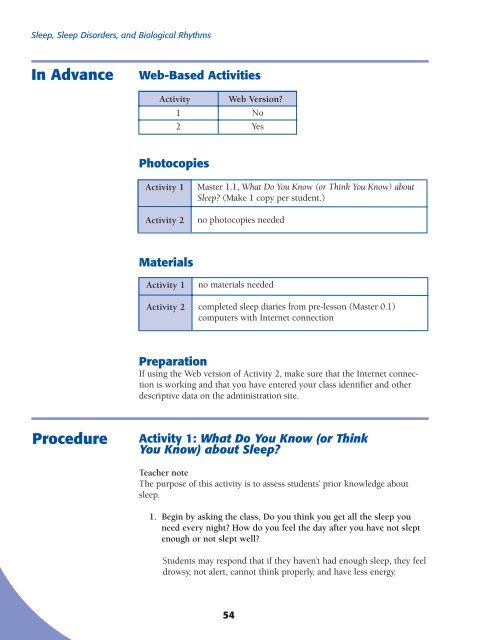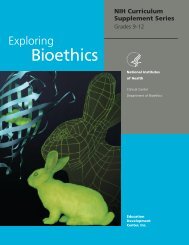Biological - NIH Office of Science Education - National Institutes of ...
Biological - NIH Office of Science Education - National Institutes of ...
Biological - NIH Office of Science Education - National Institutes of ...
You also want an ePaper? Increase the reach of your titles
YUMPU automatically turns print PDFs into web optimized ePapers that Google loves.
Sleep, Sleep Disorders, and <strong>Biological</strong> Rhythms<br />
In Advance<br />
Web-Based Activities<br />
Activity<br />
1<br />
2<br />
Web Version?<br />
No<br />
Yes<br />
Photocopies<br />
Activity 1<br />
Activity 2<br />
Master 1.1, What Do You Know (or Think You Know) about<br />
Sleep? (Make 1 copy per student.)<br />
no photocopies needed<br />
Materials<br />
Activity 1<br />
Activity 2<br />
no materials needed<br />
completed sleep diaries from pre-lesson (Master 0.1)<br />
computers with Internet connection<br />
Preparation<br />
If using the Web version <strong>of</strong> Activity 2, make sure that the Internet connection<br />
is working and that you have entered your class identifier and other<br />
descriptive data on the administration site.<br />
Procedure<br />
Activity 1: What Do You Know (or Think<br />
You Know) about Sleep?<br />
Teacher note<br />
The purpose <strong>of</strong> this activity is to assess students’ prior knowledge about<br />
sleep.<br />
1. Begin by asking the class, Do you think you get all the sleep you<br />
need every night? How do you feel the day after you have not slept<br />
enough or not slept well?<br />
Students may respond that if they haven’t had enough sleep, they feel<br />
drowsy, not alert, cannot think properly, and have less energy.<br />
54

















